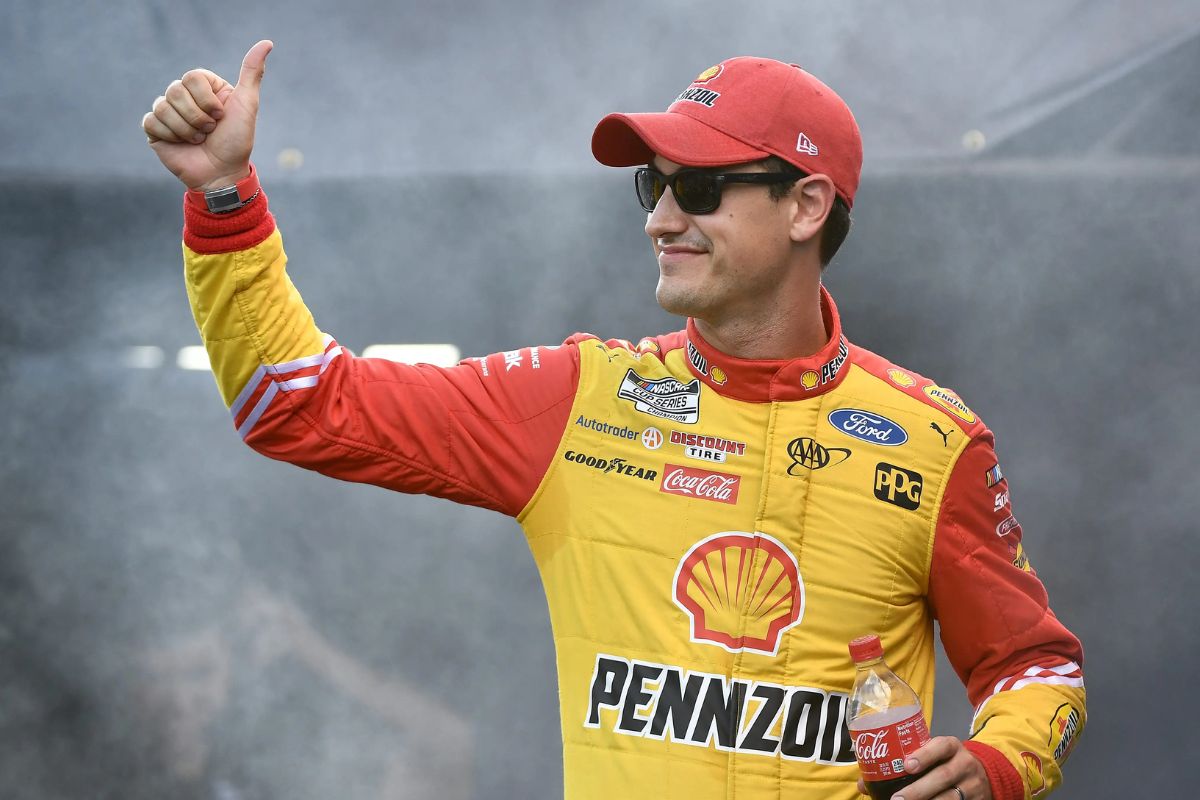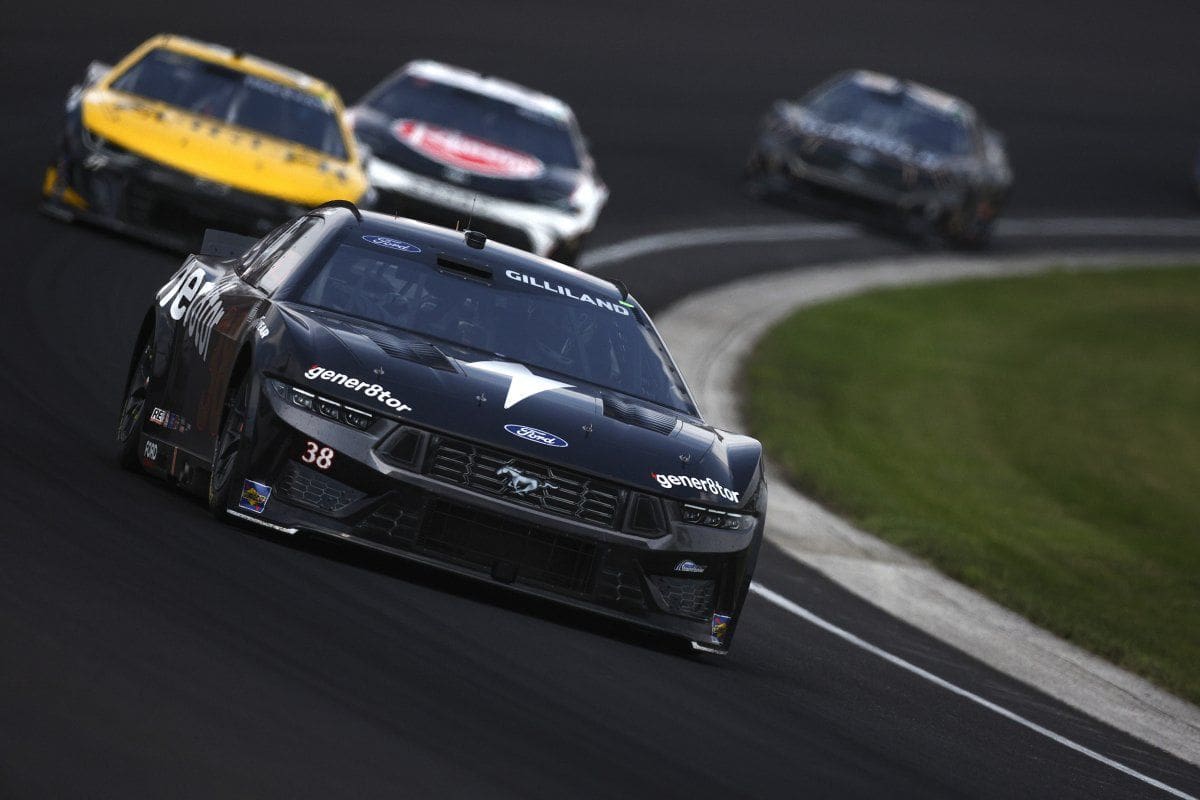Joey Logano’s Crew Chief Drops NASCAR Insights: In the midst of the NASCAR playoffs, Paul Wolfe’s insights reveal a detailed understanding of the demands teams face in ‘must win’ scenarios. His emphasis on the significance of teamwork and tactical adaptability highlights how effective communication can alter the path of a race. By reflecting on past experiences, Wolfe demonstrates the delicate balance between calculated risks and maintaining composure. As teams grapple with significant stakes, the question arises: how can these principles be effectively implemented in real-time situations to secure victory?
Key Highlights
- Wolfe emphasizes the importance of teamwork and communication during high-pressure playoff scenarios to ensure successful race strategies.
- He advocates for calculated risks as essential for innovation and gaining competitive advantages in NASCAR.
- Logano’s history of effective fuel management showcases the critical role of precision in playoff performance.
- Wolfe highlights the need for adaptability to evolving race conditions to maintain composure and achieve success.
Introduction to the Fuel Mileage Situation
In NASCAR, fuel mileage becomes a vital determinant of success, often separating the victors from the vanquished in essential moments of the race. Among the myriad challenges faced by drivers and their teams, managing fuel consumption efficiently can be the cornerstone of a winning strategy, especially during extended race scenarios.
This year’s NASCAR Cup Series has demonstrated this dynamic vividly, with several races devolving into intense fuel battles that test both the driver’s skill and the crew’s tactical insight.
One particularly dramatic instance unfolded during the Ally 400 in Nashville, where the race’s unprecedented length necessitated a rigorous evaluation of fuel reserves. As the event progressed through five overtime restarts, the stress mounted, revealing the vulnerability of teams unprepared for such a scenario. Many leading competitors faltered, their fuel strategies collapsing under the weight of the extended race conditions.
However, the No. 22 Team Penske crew, led by Joey Logano, exemplified the importance of foresight and adaptability. Logano’s situation mirrored that of his competitors, yet the team’s readiness to accept risk proved instrumental.
The crew’s calculated approach to fuel management not only preserved their competitive edge but ultimately facilitated Logano’s remarkable victory. Consequently, the intricacies of fuel mileage in NASCAR emerge not merely as logistical concerns but as crucial elements that can dictate the outcome of races.
Joey Logano’s Bold Brickyard Gamble
Joey Logano’s decisive moment at the Brickyard 400 exemplified the thin margins that can dictate a driver’s fate in NASCAR, as tactical fuel management proved essential amid intense competition.
With the stakes high, Logano faced a significant choice: to gamble on fuel strategy or play it safe. This scenario highlighted the essence of NASCAR racing, where the decisions made in the heat of competition can lead to either victory or disaster.
Logano’s strategy mirrored that of his Team Penske teammate, Brad Keselowski, who ultimately fell short due to fuel miscalculation. While Keselowski’s gamble failed, Logano executed his strategy flawlessly, demonstrating the importance of precision and timing. His ability to manage fuel consumption while maintaining competitive lap times was critical, especially in the context of a race where others faltered.
Joey Logano and crew chief Paul Wolfe needed to work off of each other to win in Nashville in June.
They looked back at that "must-win" to punch their tickets into the NASCAR Playoffs. pic.twitter.com/LZqI53Sd84
— NASCAR on NBC (@NASCARonNBC) August 1, 2024
Crew chief Paul Wolfe’s role in this make-or-break scenario cannot be overlooked. His audacious calls to drain the gas tank, despite the inherent risks, illustrated a calculated approach to racing. Wolfe’s insight into tire wear and performance allowed Logano to optimize his vehicle’s capabilities, even when running in less favorable positions.
“When you’re running 20th, there’s more of an upside than a downside to those types of calls. So as we evaluated new tire wear…to some it may seem risky to do that. But honestly” – Wolfe
The Strategy and Execution
The intricate strategy employed by Logano and his team highlighted the vital importance of both fuel management and competitive positioning in NASCAR racing. With a winless streak since March 2023 and sitting beneath the cutoff line, the stakes were exceptionally high. The decision-making involved balancing the need for a race victory against the risk of running out of fuel, a precarious tightrope that could lead to notable point losses.
Throughout the race, Logano’s adaptability became evident as he navigated a complex scenario of 110 laps, with 69 laps run under green flag conditions and 51 under caution. This environment demanded acute situational awareness, particularly during caution periods when Logano tactically shut off his engine to conserve fuel. Such actions emphasized the importance of meticulous planning and execution, critical in a race where every drop of fuel counted.
The on-track duel with Tyler Reddick further showed the execution of their strategy. Logano faced relentless strain as Reddick’s superior tire performance challenged his position. Logano’s defensive driving, particularly through Turn 2, demonstrated not only instinctual racing skill but also the peak of tactical foresight.
“I didn’t realize that Reddick was as fast as he was. When he cleared and…raided out my bumper…I gotta fight this car off on tires…his tires were so fast. I blocked him off at two, I thought I was in good shape but then we started running out of gas…Finally off of turn 4, enough of a gap where we did run out of gas…so just barely moving. Maybe not the race I thought we were gonna win, but it all worked out.” – Logano
Ultimately, Logano’s ability to maintain just enough fuel to finish the race, albeit barely moving at the end, exemplified the delicate balance of aggression and caution necessary for success in NASCAR’s playoff environment. This race encapsulated the essence of tactical execution under strain, a vital lesson for teams aiming for victory.
Paul Wolfe’s Role and Background
Guiding Joey Logano to success, Paul Wolfe‘s extensive racing background and strategic mindset have proven crucial in their collaborative achievements at Team Penske. Wolfe’s experience as a former racer, particularly in the NASCAR Busch North Series and the Busch Series, equips him with a subtle understanding of the demands and intricacies of racing. This direct knowledge allows him to make informed decisions that improve performance on the track.
Wolfe’s role as crew chief for the No. 22 team transcends traditional leadership; he embodies a daring approach that challenges drivers to push their limits. His fearless attitude resonates with Logano, who acknowledges that driving under Wolfe’s guidance often places him in ‘uncomfortable scenarios.’ This discomfort is not merely a byproduct of Wolfe’s methods but a calculated choice designed to foster growth and adaptability in the driver, ultimately leading to their 12 victories together over five seasons.
“It’s fun driving for him, it’s a little uncomfortable. He puts you in an uncomfortable scenario.” – Logano
The duo’s synergy is not just about driving fast; it involves a meticulous orchestration of strategy, communication, and execution. Wolfe’s ability to navigate the complexities of race day, coupled with his commitment to innovation, positions him as a crucial figure in the pursuit of excellence within NASCAR.
As the playoffs intensify, the interplay between Wolfe’s tactical insight and Logano’s competitive spirit will be paramount in overcoming the challenges ahead. Their relationship highlights the profound impact that a skilled crew chief can have on a driver’s performance and comprehensive team success.
Relationship Between Logano and Wolfe
A strong partnership characterized by mutual respect and understanding defines the relationship between Logano and Wolfe, allowing them to maneuver the stresses of high-stakes racing effectively. Logano’s appreciation for Wolfe’s racing mentality emphasizes the depth of their collaboration. By describing Wolfe as the “most competitive person” he has encountered, Logano highlights not only Wolfe’s resolve but also his subtle approach—one that often goes unnoticed yet is crucial in high-pressure situations.
“Paul’s a racer. He wants to win…is the most competitive person I think I’ve met, and he does it in a quiet way, so no one really knows..doesn’t talk a whole bunch. I kind of pull it out of him sometimes.”
“There’s no high; there’s no low, it’s just here [with Wolfe]. When we win, I get emotional; I get excited. I’m like, ‘We work so hard. You get so pissed off when we don’t win, can you be happy when we do win?’ It’s fun to work with him.” – Logano
This dynamic is further enriched by their open communication. Logano feels comfortable expressing his emotions and frustrations, knowing that Wolfe maintains a consistent demeanor regardless of the outcome. The balance between Logano’s emotional highs and Wolfe’s steadfast nature fosters a stable environment conducive to performance.
The unity within the No. 22 Team Penske is evident, as both Logano and Wolfe are driven by a shared goal of victory. This synergy not only strengthens their bond but also cultivates an environment where calculated risks are accepted rather than feared.

News in Brief: Joey Logano’s Crew Chief Drops NASCAR Insights
Paul Wolfe’s insights highlight the critical nature of teamwork and communication in high-pressure NASCAR playoff situations.
The experiences shared reflect the necessity for tactical adaptability and the execution of calculated risks.
By fostering confidence and maintaining composure, teams can effectively navigate the complexities of ‘must win’ scenarios.
These lessons not only improve performance but also reinforce the importance of collaboration in achieving success within the demanding landscape of competitive racing.
ALSO READ: Paul Wolfe Drops Game-Changing Tire Results Impacting the Way of Race


